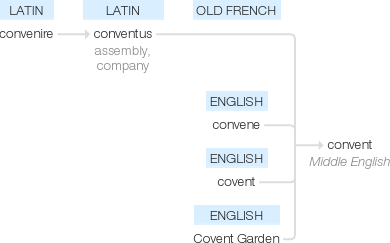Convent
Middle English: from Old French, from Latin conventus ‘assembly, company’, from the verb convenire (see convene). The original spelling was covent (surviving in the place name Covent Garden ); the modern form dates from the 16th century.
wiktionary
From Middle English convent, variant of covent, from Old French covent, from Latin conventus, perfect participle of the verb convenio (whence ultimately convene), see con- + venio. Doublet of coven
From Latin convenio (past participle conventus), whence also convene; so of the same ultimate origin as Etymology 1.
etymonline
convent (n.)
c. 1200, covent, cuvent, "association or community of persons devoted to religious life," from Anglo-French covent, from Old French convent, covent "monastery, religious community," from Latin conventus "assembly," used in Medieval Latin for "religious house," originally past participle of convenire "to come together, meet together, assemble; unite, join, combine; agree with, accord; be suitable or proper (to)," from assimilated form of com "with, together" (see con-) + venire "to come" (from PIE root *gwa- "to go, come").
Meaning "a house or set of buildings occupied by a community devoted to religious life" is from mid-15c. Not exclusively feminine until 18c. The form with restored Latin -n- emerged early 15c. The Middle English form lingers in London's Covent Garden district (notorious late 18c. for brothels), so called because it had been the garden of a defunct monastery.
COVENT GARDEN ABBESS. A bawd.
COVENT GARDEN AGUE. The venereal diſeaſe.
["Classical Dictionary of the Vulgar Tongue," 1796]
Related: Conventual.
